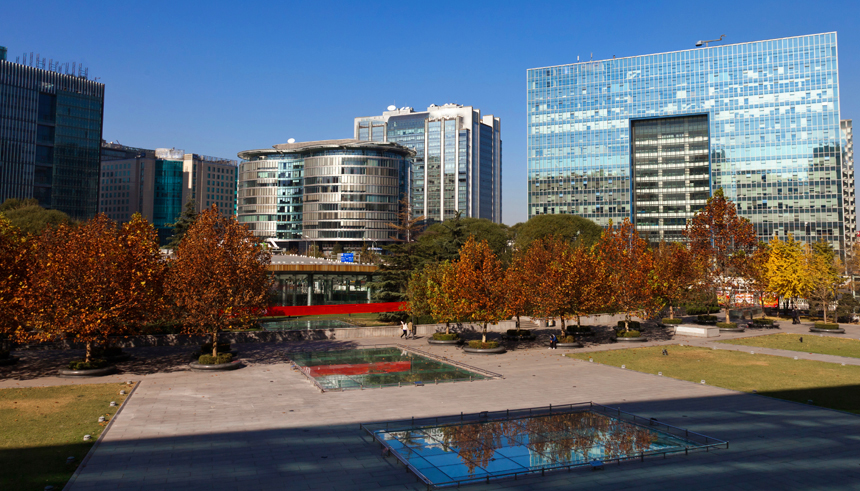US-Asia Business
China's High Flying Tech Startup Scene
By Daniel Allen

Tech entrepreneurs brainstorm startup ideas over cappuccinos in China’s free trade zones.
At the beginning of this year, Chinese media said that university students in China were only passionate about two things: making a fast buck through domestic share dealing and launching a high-tech startup. While recent Chinese stock market volatility has punctured the former ambition, the campuses and coffee shops of China's big cities still abound with eager young minds hoping to emulate their Silicon Valley heroes.
China's startup scene, which for many years lay in the doldrums, really took off with e-commerce giant Alibaba Group Holiding Ltd.'s initial public offering (IPO) in September 2014. A few months later, Chinese smartphone manufacturer Xiaomi Inc. raised US$1.1 billion in a round of funding that valued the Beijing-based company at US$46 billion, making it the world's most valuable tech startup (at the time). According to New York-based CB Insights, China now boasts 19 "unicorns" (startup companies valued at US$1 billion or more by venture capital firms), with Xiaomi topping the group.
For many investors, these record-breaking numbers epitomize the promise of China's booming high-tech sector, which is underpinned by the country's legions of smartphone and Internet users. This has seen the amount of money being channeled into Chinese startups surge during the last two years. Hong Kong-based AVCJ Research estimates that nearly US$15.8 billion was invested in Chinese tech startups during the first eight months of 2015, up from US$3.8 billion during the same period last year.
"China is now the second-biggest startup market and the leading 'mobile-first' (first encounter with Internet via mobile) market in the world," says William Bao Bean, a partner at venture capital (VC) outfit SOS Ventures and managing director of Chinaccelerator, a leading Chinese accelerator (a company that provides funding and mentorship for startups for a short period of time) based in Shanghai.
"Today genuine high-tech innovation is really on the rise in China," Bean continues. "Over the last 18 months we've seen the quality and market potential of Chinese tech startups increase considerably."
Zoning in

"Over the last 18 months we've seen the quality and market potential of Chinese tech startups increase considerably."
Today innovation and technology are the key buzzwords of Chinese industry. In May, Beijing outlined its "Made in China 2025" strategy, a comprehensive plan to drive the Chinese economy's transition away from low-end manufacturing toward high-tech, high-value-added sectors. Providing support for privately founded tech startups is seen as one way of furthering such economic progression.
Never ones to shy away from implementing sweeping, top-down measures, China's leaders are backing up their words with a bountiful war chest. In January, the Chinese government announced plans to establish a US$6.5 billion VC fund to help seed companies in emerging industries, including innovative tech startups. More recently the government has also offered such companies tax breaks and secured loans.
Beijing's rhetoric and promise of financial assistance have seen a slew of high-tech zones set up across China. Here, tech-minded entrepreneurs can enjoy superfast broadband and generous government funding, as well as access to startup incubators and skilled programmers. According to the government, more than 1,600 such incubators had been set up across China by the end of 2014, with 80,000-plus startup projects employing 1.75 million people.
"In the past, China's high-tech parks and zones tended to be inefficient entities," says Bean. "Local governments proved [to be] poor evaluators of potential and would simply try to attract established brands.
"Over the past two to three years, this policy has changed," Bean continues. "Now governments on all levels are choosing to partner with established entrepreneurs and investors looking to put their own money into startups. This public-private partnership has proven far more beneficial in terms of nurturing profitable innovation."
Capital creation
In contrast with the United States, where tech startups are largely aggregated in California, the picture in China is far more disparate. Nevertheless, it is Beijing - and more specifically the area of Zhongguancun in the northwest of the city - that can claim the closest resemblance to Silicon Valley.
Initially a ragtag collection of electronics malls, Zhongguancun started its tech-focused journey in the 1980s. Today it is home to such heavyweights as Chinese search engine Baidu Inc. and computer maker Lenovo Group Ltd., while Beijing's wider digital ecosystem is supported by myriad research labs, "makerspaces," angel funds and incubators such as former Google China President Kai-Fu Lee's Innovation Works. In June last year, an entire Zhongguancun-based "startup street" named Z-innoway began hosting startup cafés, accelerators and other startup scene stakeholders.
Like any tech hub, Zhongguancun needs money to thrive. Incubators, accelerators and startup cafés allow investors to interface with the local army of entrepreneurs, which includes everyone from students and overseas returnees to those Chinese who have quit their jobs to seek a tech-based fortune.
"Coffee shops are a big part of Zhongguancun's startup environment," says Thibaud Andre, a consultant with China-based Daxue Consulting. "What effect they are having on the Chinese economy as a whole is hard to say, but they are certainly boosting innovation."
Amongst the most high-profile Zhongguancun coffee shops are The Garage Cafe and 3W Coffee, both of which have hosted recent visits by Chinese Premier Li Keqiang.
"The owners of these cafés have developed real startup-focused environments," says Andre. "There's a lot of gathering and networking involved. Rather than hotbeds of brainstorming, they are places where actors of the startup environment congregate and interact. All of the major tech entrepreneurs and investors in Beijing show up at least once a month here."
Market correction
Despite the grassroots enthusiasm, sceptics are quick to offer notes of caution on China's tech startup scene. Harnessing young, innovative energy may or may not have a significant impact on the Chinese economy, but the vast majority of the country's tech startups still end in failure. Some analysts accuse investment-focused VCs of neglecting their portfolio companies, while others dismiss massively valued Chinese tech startups as paper tigers that have yet to turn a profit.
Many market watchers are also concerned that Beijing's focus on startups and tech entrepreneurs will end in tears, with overfunding and excess capacity leading to bubble creation and collapse. But while China's recent stock market turmoil and ongoing economic uncertainty already appear to have put a damper on investments, this may actually be a good thing.
"I'm not worried about bursting bubbles," says Reid Wang, a consultant with Hong Kong-headquartered Sino-Bridge China Consulting Ltd. "In many cases, experienced investors are injecting their own capital into these startups. These people with their 'smart money' have the business acumen to evaluate real potential, be selective and keep valuations honest."
"Stock market issues have led to a healthy reduction in valuations and the volume of deals being done," says William Bao Bean. "The previous 18 months had seen a crazy increase in startup valuations that were simply unsustainable."
Sign up for the Reach Further Newsletter
We’ll keep you in the know about the latest US-Asia business news and trends.
Suscríbase al boletín Reach Further
Lo mantendremos informado sobre las últimas noticias y tendencias comerciales entre Estados Unidos y China.

